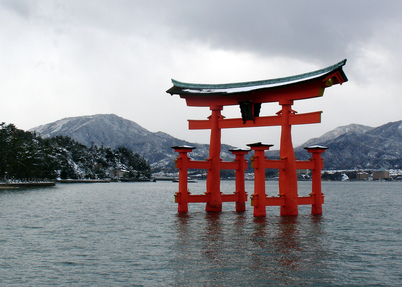Religion

Shinto Symbol
Although Jordan claims he was fundamentally a religious man, he never professed allegiance to any particular denomination of Christianity. He felt that Christianity took the right side on every great moral issue. Despite his allegiance to Christianity, Jordan believed that most religions were founded during the infancy of the human race and were based in ignorance, superstition, and fear. He once told a student that if he had not been brought up as a Christian, he would have chosen to be a follower of Shintoism, which he believed to be the worship of nature (#1 p.180-183).
While at least superficially religious, Jordan ultimately praised science as the organizer of the natural world rather than God and Christianity. He believed that if there was no conflict, then theologians would have never disputed the findings in scientific fields like astronomy and geology. He contended that either science or theology would win this conflict, evident by his statement that whichever "is true, is the truest thing in the world" (#1 p. 186). He opined that science would emerge victorious.
Jordan considered religion as incurably conservative and science as naturally progressive. He noted that although religion demands good conduct, it cannot inform what good conduct actually is (#1 p. 187). According to Jordan, blindly following religion is similar to receiving a bad education. It preaches morality but does not inculcate how to think and become wise, which are a part of the thought processes necessary to discern the right from the wrong. Science can teach a man how to think and will provide the standards for moral guidance. The safest guide to human conduct was derived from personal discovery and human experience and not empty religious edict (#1 p. 190).
While at least superficially religious, Jordan ultimately praised science as the organizer of the natural world rather than God and Christianity. He believed that if there was no conflict, then theologians would have never disputed the findings in scientific fields like astronomy and geology. He contended that either science or theology would win this conflict, evident by his statement that whichever "is true, is the truest thing in the world" (#1 p. 186). He opined that science would emerge victorious.
Jordan considered religion as incurably conservative and science as naturally progressive. He noted that although religion demands good conduct, it cannot inform what good conduct actually is (#1 p. 187). According to Jordan, blindly following religion is similar to receiving a bad education. It preaches morality but does not inculcate how to think and become wise, which are a part of the thought processes necessary to discern the right from the wrong. Science can teach a man how to think and will provide the standards for moral guidance. The safest guide to human conduct was derived from personal discovery and human experience and not empty religious edict (#1 p. 190).
